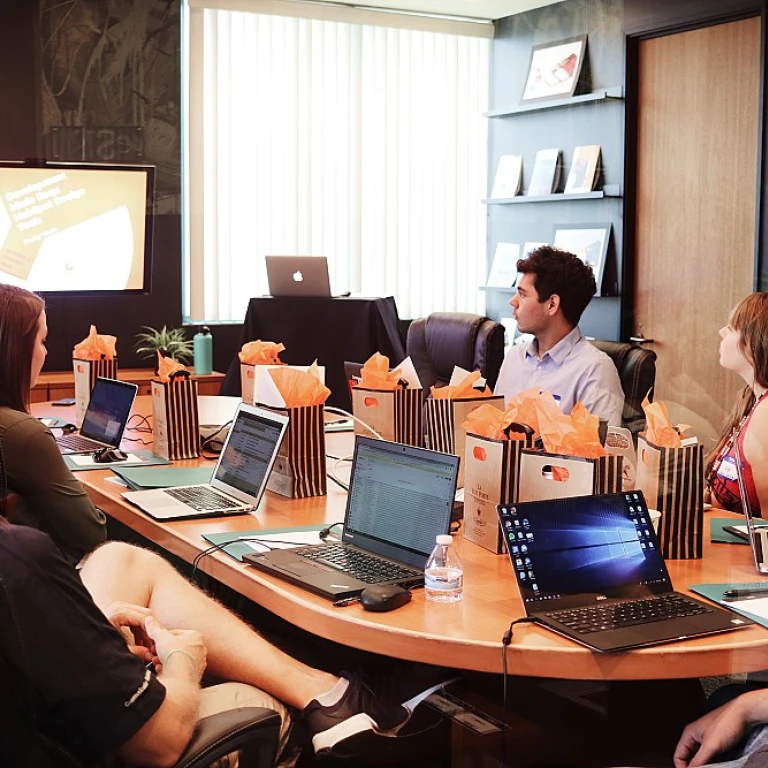
Understanding the Evolving Role of People Operations Specialists
The Transforming Landscape of a People Operations Specialist
The role of a People Operations Specialist in remote work has evolved significantly in recent times, adapting to the unique needs of businesses and employees in today's dynamic environment. Previously, the position largely revolved around traditional human resources tasks. However, with the rise of remote work, these specialists now play a vital role in ensuring employees stay engaged and connected, even when they're miles apart. These specialists are pivotal in shaping a company's culture within remote jobs, where direct interactions are limited. They're responsible for implementing policies that encourage effective communication and fostering a sense of belonging among employees, regardless of location. This isn't an easy job, as it requires balancing various interests and ensuring adherence to the company's privacy policy.Navigating Modern Challenges
People Operations Specialists face numerous challenges, such as maintaining productivity and morale in a fully remote setting. As remote work becomes more prevalent, these specialists must address issues unique to this environment, such as remote employee engagement and tech-related obstacles. To navigate this evolving landscape, these specialists must be agile and innovative. They apply their skills to develop strategies that not only keep employees engaged but also retain talent in an increasingly competitive market for remote jobs. Leveraging technology while maintaining human-centric operations is crucial. Remote operations demand new approaches, and finding the right team dynamics is vital for success. Given these challenges and responsibilities, the People Operations Specialist has truly become a cornerstone in remote operations. Companies looking to hire for this position typically value experience in tech-savvy environments, as well as a background in dealing with complex human resources issues. For tips on how companies are pushing employee engagement forward, you can view these strategies that are tailored to remote work settings.Key Challenges in Remote Employee Engagement
Addressing the Complexities of Remote Engagement
In the realm of remote work, the role of a People Operations Specialist has become increasingly crucial. As companies transition to remote operations, they face unique challenges in maintaining employee engagement. The shift from traditional office settings to remote jobs has highlighted the need for innovative strategies to keep teams motivated and connected.
Communication Barriers and Solutions
One of the primary challenges in remote employee engagement is overcoming communication barriers. Without the face-to-face interactions that occur naturally in an office, remote teams can feel isolated. People Operations Specialists must find ways to foster open communication and ensure that every team member feels heard and valued. Utilizing tech tools like video conferencing and instant messaging platforms can help bridge the gap, but they require careful management to avoid overwhelming employees.
Maintaining Company Culture Remotely
Another significant challenge is maintaining a cohesive company culture. In a remote work environment, it can be difficult to instill the same sense of community and shared purpose that exists in a physical office. People Operations teams need to be creative in finding ways to reinforce company values and promote a sense of belonging among remote employees. This might involve virtual team-building activities or regular check-ins to ensure that everyone feels connected to the company’s mission.
Balancing Flexibility and Accountability
Remote work offers employees greater flexibility, but it also requires a new approach to accountability. People Operations Specialists must work with managers to set clear expectations and provide the necessary support for employees to succeed in their roles. This involves developing metrics that accurately reflect performance in a remote setting and ensuring that employees have the resources they need to meet their goals.
For more insights on how to navigate these challenges and unlock the potential of your remote workforce, consider exploring unlocking potential through talent mobility.
Strategies for Enhancing Remote Employee Engagement
Enhancing Engagement in a Remote Work Environment
Strategically boosting employee morale and engagement in a remote work environment presents unique hurdles, given the shifting dynamics from a traditional office setting. However, organizations can implement targeted methods to foster a thriving virtual culture.- Promoting Transparent Communication: Keeping the lines of communication open is crucial. People operations specialists in remote settings should ensure that feedback flows freely within the team. Tools like Slack or Microsoft Teams facilitate daily interactions and help keep employees connected and informed.
- Prioritizing Work-Life Balance: Encouraging employees to manage their time effectively can lead to enhanced productivity and job satisfaction. Setting clear expectations about working hours and respecting personal time ensures employees don't feel overwhelmed.
- Providing Access to Resources: Equipping employees with the necessary technologies and tools for remote work is essential. Access to tech resources not only empowers them but also streamlines operations, making remote jobs easier to handle and akin to their in-office counterparts.
- Championing Recognition Programs: Implementing a system of regular recognition acknowledges contributions and achievements, thereby enhancing professional satisfaction. Celebrating successes, no matter how small, keeps morale high and the team motivated.
The Impact of Technology on Remote Employee Engagement
Revolutionizing Engagement Through Innovative Tools
In today's swiftly changing digital landscape, technology plays a crucial role in remote employee engagement. The People Operations Specialist is at the forefront of this transformation, leveraging tech solutions to optimize both team dynamics and individual productivity. Companies that succeed in remote environments often do so by effectively applying diverse technological tools, which bridge the gap caused by geographical distances and asynchronous work schedules. With the increase in remote jobs, tech tools allow operations specialists to maintain a cohesive team environment and foster a sense of belonging. Here are a few ways technology is shaping remote employee engagement:- Virtual Collaboration Platforms: Platforms like Slack and Microsoft Teams have become integral in remote operations. These tools not only facilitate seamless communication but also allow operations full teams to share resources and maintain operational coherence. Such platforms support both formal and informal interactions, crucial for sustaining employee engagement and company culture.
- Performance Management Software: Operations jobs require tracking and managing performance metrics remotely, and tools like Lattice or 15Five are increasingly essential. They offer full-time managers real-time data to improve employee experiences and help operations coordinators provide constructive feedback.
- Digital HR Solutions: Utilizing digital human resources (HR) tools can streamline processes like onboarding and performance evaluations. Operations specialists apply these tools to offer a smooth employee journey from the time they view a job posting to fulfilling their role in the company.
Case Studies: Success Stories from the Last Week
Success Narratives and Best Practices in Remote Engagement
The effectiveness of remote employee engagement is vividly illustrated through successful case studies. Numerous instances from the United States showcase how companies have adeptly navigated the remote landscape to foster engagement and productivity during the past week. For example, operations specialists and people managers have implemented full-time remote work strategies, harnessing the potential of remote operations to elevate team morale. A particular company saw impressive results by restructuring their human resources approach to include remote jobs that are more inclusive and supportive of team dynamics. This not only improved job satisfaction but also enhanced the overall experience for employees. In another instance, a people business partner in a tech firm identified that providing employees with tailored resources and a more personalized work environment significantly boosted engagement. The company adopted privacy policy enhancements that not only ensured compliance but also reassured remote workers about their privacy and data security. Furthermore, a recent initiative that caught attention was when a business in New York appointed a director of people operations who implemented a remote operations model that prioritized clear communication channels, resulting in eliminating time lags and improving job performance among remote employees. These success stories highlight that the role of a people operations specialist in remote settings is critical. Implementing strategies such as these helps address the intrinsic challenges of remote work, ensuring that employee engagement remains a priority and tech solutions are effectively utilized to create cohesive teams. For anyone looking to adapt or learn from these experiences, reviewing recent successful case studies provides valuable insights and proven methodologies.Future Trends in Remote Employee Engagement
Emerging Patterns and Opportunities in Remote Employee Engagement
As the remote work landscape continues its transformation, the future of employee engagement holds exciting possibilities. Here are key trends shaping tomorrow's workplace:- Evolving Roles: People operations specialists are increasingly stepping into strategic positions, redefining how companies engage with their remote workforce. The demand for skilled professionals adept at navigating these evolving roles reflects in the growing number of operations jobs, emphasizing a full understanding of remote dynamics.
- Integration of Advanced Technological Solutions: The impact of technology on engagement can't be overstated. As discussed earlier, effective tech tools are essential in creating meaningful connections and preventing isolation among remote employees. Future solutions are likely to integrate artificial intelligence and machine learning to customize engagement strategies further.
- Focus on Comprehensive Employee Experience: Companies are shifting towards a more holistic approach, viewing engagement as interconnected with the overall employee experience. Roles like human resources generalists and people operations coordinators are pivotal in orchestrating this interconnected spectrum, from employee onboarding experiences to ongoing development and satisfaction.
- Greater Emphasis on Flexibility and Well-being: Flexibility continues to be a central tenet of remote work, with businesses increasingly prioritizing employees' well-being. Future business models are likely to intertwine these elements, creating remote jobs that reflect both adaptability and support.
- Strengthening Data-Driven Engagement Practices: Companies are turning to data analytics for deeper insights into their workforce's preferences and challenges. This shift promises a more personalized approach to engagement, driven by data-backed strategies developed and overseen by specialists like people operations managers and directors.













